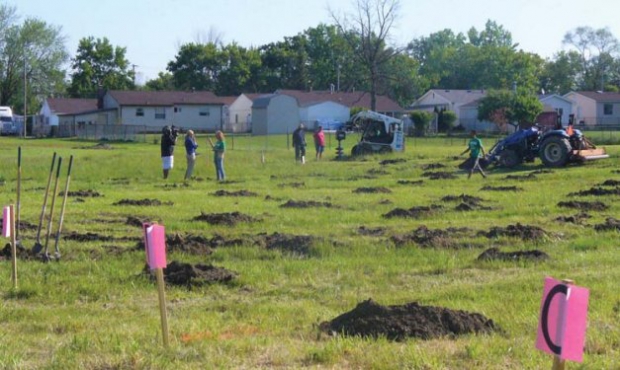
This lot was cleared of trash and a cover crop established to prepare it for planting.
It’s located on the north side of Flint, Michigan, in an area called Beecher, which used to be a thriving community with a strong main street, she said. In the 1980s, General Motors began reducing its automobile manufacturing business in Flint, and with it went Turnstead, an automotive parts manufacturing company located in Beecher. Michael Moore’s movie, Roger and Me, documents the effects of GM’s decision to set up factories in Mexico and end the jobs of 30,000 of the 80,000 GM workers in Flint.
Dora and her husband moved to Beecher 24 years ago. They started a business, King Karate, teaching martial arts to young people, and from that base they built a nonprofit organization called Youth Karate-Ka Harvesting Earth Educational Farm.
They applied to the Fruit Tree Planting Foundation for the trees, help in planting the orchard, and the training to manage them. The urban orchard was planted on May 20 by about 200 volunteers, including the Kings’ students.
Dora calls it “the process of reinventing ourselves,” using vacant urban land to make city dwellers more self-reliant and healthier. From using martial arts as a way to teach low-income kids self-control and self-esteem, they went into produce gardening to teach youngsters how to work and how to profit from work, and to bring fresh produce into the community.
The Kings learned quickly how to tap into the traditional land-grant university services rural farmers use. They found Michigan State University Extension and educator Bob Tritten, who serves horticulturists in all of eastern Michigan. He set up classes for them and their students. The latest was in fruit tree pruning.
They were the first urban farmers to win the state’s Small Farmer of the Year Award, selected in 2011 for their conservation efforts by the Natural Resources Conservation Service in Michigan.
The Kings and their students spent three years clearing lots and then growing cover crops and otherwise preparing the soil for planting. The vacant land had been a dumping ground for trash and was filled with broken concrete, old tires, couches, and other junk. They began selling produce in 2008.
Their unheated hoop houses operate year-round. In winter, the Kings grow spinach and other cold-tolerant crops. The rest of year, they grow carrots, potatoes, tomatoes, onions, peas, broccoli, lettuce, peppers, and they also raise chickens. They grow vegetables outdoors, on vacant lots, as well. Youth Karate-Ka, the nonprofit, now owns 33 vacant lots in Flint and Beecher.
Young people who work on the farm earn money from selling produce at the Flint Farmers’ Market, to local restaurants, and to local residents. The principles that apply to vegetable produce will be used with fruit from the orchard.
One key thing that has helped the Kings and others like them was the state of Michigan’s decision a decade ago to create the Michigan Land Bank. It streamlined the process for returning tax-reverted properties to productive use. Instead of waiting seven years and then auctioning off the properties—with title remaining clouded—the Land Bank system hands reverted properties to the local county treasurer, along with clear title, and then works with the treasurer to determine the best use of the land. Vacant lots are often sold to adjoining property owners for as little as a dollar.
Vacant houses and other buildings are either demolished or rehabilitated. Abandoned buildings, as well as being an eyesore, attract drugs and crime, cost money to police and maintain, and lead to further degradation of the neighborhood. The Michigan Land Bank currently has for sale 8,000 residential or commercial properties that were foreclosed for delinquent real property taxes.
Another of the Kings’ benefactors is the Ruth Mott Foundation. She was the wife of Charles Stewart Mott, one of the original founders of General Motors, which began in Flint in 1908. The Motts were very much concerned about the vitality of their city, and created supportive foundations.
The Kings say their goal is to make the farming operations self-sufficient, and not dependent on foundation funds.
The Kings have been featured in newspaper articles, film documentaries, and videos. Find them on YouTube by searching for The Kings of Flint.

Leave A Comment